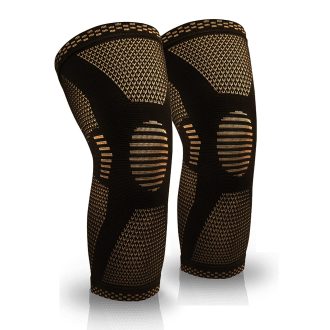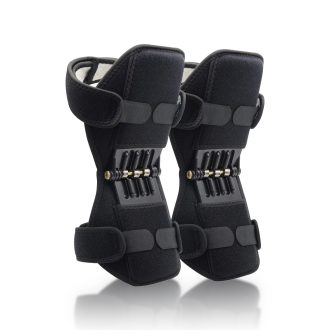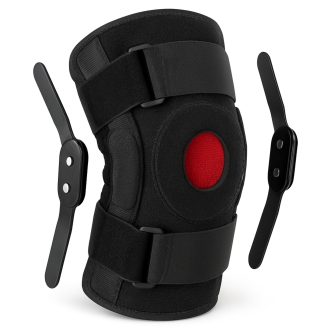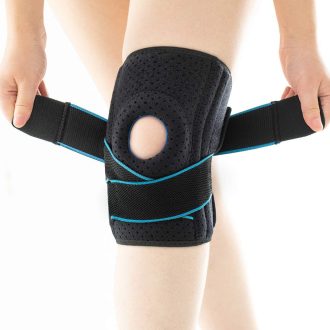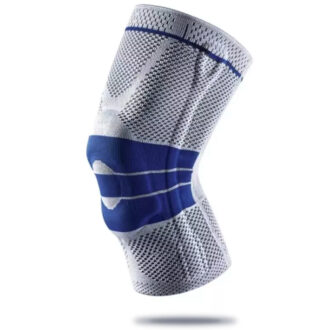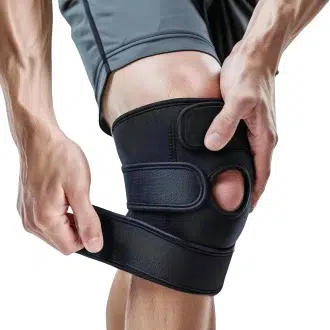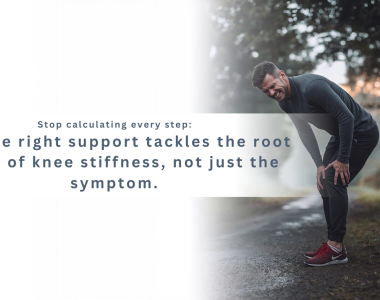No products in the cart.
What could be causing the stiffness in my knees, especially in the morning?
Welcome to the latest edition of the NuovaHealth Q&A series, where we explore your most pressing health questions with expert insights and practical advice. Today, we’re addressing a concern that many can relate to: that persistent stiffness in the knee that greets you in the morning and lingers just enough to make you wonder what’s happening. Our reader, who is in their late 40s and generally in good health, has noticed this discomfort appearing after starting a new jogging routine. Is there a connection, or could something else be at play? Whether you’re an exercise enthusiast or someone experiencing similar symptoms, join us as we explore the potential causes of knee stiffness and share effective strategies to help you move more comfortably throughout your day. Let’s get started!
Hello! I’ve been experiencing quite a bit of stiffness in my knees, particularly when I wake up in the morning. It’s been going on for a few weeks now, and I’m starting to get a bit concerned. I’m in my late 40s and generally in good health, but I’ve noticed that the stiffness tends to ease up a bit as the day goes on, especially after I move around. I haven’t had any recent injuries, but I did start a new exercise routine a couple of months ago, which includes jogging a few times a week. Could this be related, or might it be something else? I’m really curious about what could be causing this and what steps I might take to alleviate the discomfort. Any insights or advice on how to manage this would be greatly appreciated. Thank you!
Hello! Thank you for your question. Let’s dive right in and explore some possible reasons for the stiffness in your knees, as well as discuss ways to alleviate your discomfort.
Understanding Knee Stiffness
Osteoarthritis
Osteoarthritis is a degenerative joint disease characterized by the breakdown of cartilage, the smooth protective tissue at the ends of bones that facilitates smooth movement within joints. It is the most common form of arthritis and primarily affects weight-bearing joints such as the knees, hips, and spine, although it can occur in any joint.
Causes of Osteoarthritis:
- Age: As we age, the ability of cartilage to heal decreases. Osteoarthritis is more common in older adults, as years of joint use can contribute to the wear and tear of cartilage.
- Joint Injury: Previous injuries to a joint, such as fractures or tears, can increase the risk of developing osteoarthritis later in life. The damage from these injuries can disrupt the integrity of the joint structure.
- Obesity: Excess body weight increases the stress on weight-bearing joints like the knees and hips. This additional pressure can accelerate the breakdown of cartilage over time.
- Genetics: There may be a hereditary component, as certain genetic traits can increase susceptibility to joint damage.
- Overuse of Joints: Repetitive movements or overuse of certain joints in occupational or athletic activities can contribute to the development of osteoarthritis.
Symptoms to Look Out For:
- Pain: As cartilage deteriorates, bones begin to rub against each other, causing pain and discomfort during movement.
- Stiffness: This often occurs after periods of inactivity or rest. The loss of cartilage can lead to reduced joint flexibility.
- Swelling: Inflammation within the joint can lead to swelling, contributing to the sensation of stiffness.
- Grating Sensation: Without cartilage to provide a smooth, gliding surface, affected joints may produce a grating or crackling sensation with movement.
Other Common Causes
While osteoarthritis tops the list, other potential causes include:
- Tendinitis: This is the inflammation of the tendons surrounding the knee joint, often triggered by repetitive movements or a sudden increase in physical activity.
- Bursitis: This condition arises when the bursae—small, fluid-filled sacs that cushion the knee joint—become inflamed. Bursitis is often a result of prolonged pressure, frequent kneeling, or an acute injury and can lead to swelling and stiffness.
- Rheumatoid Arthritis: Unlike osteoarthritis, rheumatoid arthritis is an autoimmune condition where the body’s immune system mistakenly attacks healthy joint tissues. Morning stiffness that gradually improves with activity is a hallmark symptom of this condition.
- Patellofemoral Pain Syndrome: Often referred to as “runner’s knee,” this condition is characterized by pain around the kneecap. It’s commonly caused by overuse, muscle imbalances, or misalignment, leading to stiffness and discomfort during activities like running or climbing stairs.
- Meniscus Tears: The meniscus is a C-shaped piece of cartilage that acts as a cushion between your thighbone and shinbone. Tears can occur due to sudden twists or turns, particularly in sports, leading to pain, swelling, and stiffness in the knee.
- Ligament Injuries: Injuries to the ligaments, such as the anterior cruciate ligament (ACL) or the medial collateral ligament (MCL), often result from high-impact sports or accidents. These injuries can cause significant pain and stiffness, limiting knee movement.
- Gout: This is a type of arthritis caused by the accumulation of uric acid crystals in the joints, leading to sudden and severe pain, redness, and stiffness in the knee. Gout attacks can be unpredictable and intensely painful.
- Infection: Septic arthritis is an infection in the joint, often caused by bacteria. It can lead to rapid onset of swelling, intense pain, and stiffness, requiring immediate medical attention to prevent joint damage.
- Exercise-Related Strain: Your new jogging routine might be contributing to this discomfort due to increased stress on your knees.
Cancer
While it’s rare for cancer to be a direct cause of knee stiffness, there are certain types of cancer that can potentially affect the knee joint and surrounding areas, leading to discomfort and stiffness. Here are some examples:
- Bone Cancer: Primary bone cancers, such as osteosarcoma or chondrosarcoma, can develop near the knee. These malignancies might start in the long bones of the leg, such as the femur or tibia, potentially causing knee stiffness. The cancerous growth can invade the surrounding bone and soft tissue, leading to inflammation, swelling, and restricted mobility of the joint.
- Metastatic Cancer: Cancers from other parts of the body including those near the knee. The presence of cancer cells in the bone can lead to pain and stiffness due to bone weakening, pathological fractures, or joint effusion.
- Leukemia and Lymphoma: These blood-related cancers can sometimes cause joint symptoms, including stiffness and pain in the knees. This can occur due to the infiltration of cancerous cells into the bone marrow or as a result of inflammatory processes triggered by the cancer.
- Soft Tissue Sarcomas: Though less common, soft tissue sarcomas near the knee can affect the joint indirectly. These tumors can compress nerves or blood vessels, leading to pain and stiffness.
It is important to seek medical attention if you experience persistent knee stiffness, especially if accompanied by other symptoms such as unexplained weight loss, fatigue, or swelling. A healthcare professional can perform a thorough evaluation, which may include imaging studies like X-rays or MRIs, to rule out or confirm the presence of cancer. Additionally, blood tests can be important in diagnosing cancers like leukemia, as they can reveal abnormalities in blood cell counts or the presence of cancer markers.
Early detection and diagnosis are key to effectively managing any potential underlying conditions. If cancer is involved, timely intervention can significantly improve treatment outcomes and overall prognosis.
Managing Knee Stiffness
Lifestyle Adjustments
Long-term management of knee stiffness often necessitates lifestyle adjustments.
- Stay Active:
- Engaging in regular physical activity is crucial for maintaining joint flexibility and reducing stiffness. Incorporate exercises that focus on range of motion and strengthening the muscles around the knee.
- Recommended Activities: Consider low-impact exercises such as swimming, cycling, and walking. These activities help improve joint function without putting excessive strain on the knees.
- Weight Management:
- Achieving and maintaining a healthy weight is vital for reducing the pressure on knee joints. Excess weight can exacerbate stiffness and contribute to further joint degradation.
- Diet and Nutrition: A balanced diet rich in anti-inflammatory foods, such as fruits, vegetables, and omega-3 fatty acids, can support joint health and facilitate weight management.
- Stretching and Flexibility:
- Regular stretching exercises can enhance flexibility and prevent stiffness. Focus on stretches that target the quadriceps, hamstrings, and calf muscles.
Medical Interventions
- Consultation with Healthcare Professionals:
- It is essential to seek advice from healthcare providers who can assess the severity of your knee stiffness and recommend appropriate treatments.
- Physical Therapy: A physical therapist can develop a personalized exercise program designed to strengthen the knee and improve its range of motion.
- Medications: Depending on the cause of stiffness, doctors may prescribe anti-inflammatory medications or pain relievers to manage symptoms.
- Advanced Treatments:
- In some cases, more advanced interventions like injections or surgery may be necessary, especially if stiffness is due to underlying conditions such as arthritis.
The Role of Supportive Devices
Supportive devices are essential for managing knee stiffness, providing both stability and comfort. Here at NuovaHealth we offer an array of knee braces designed to support joint function and alleviate discomfort. These braces are engineered to provide compression and warmth, which can enhance circulation and reduce stiffness. By stabilizing the knee, they help prevent further injury, allowing for more confident and pain-free movement.
The Benefits of Cold Therapy
Cold therapy is an effective method for reducing inflammation and alleviating pain associated with knee stiffness. Our range of ice pack wraps are specifically designed to contour the knee, delivering targeted cold therapy to minimize swelling and discomfort. Using these wraps after physical activity or at the onset of pain can significantly enhance recovery and improve overall knee function.
NuovaHealth products are made from premium materials that ensure durability without compromising comfort. The breathable fabric allows for extended wear, making them suitable for both active individuals and those needing support during routine tasks.
-
 1x Pair of Copper Knee Braces£19.99inc VAT
1x Pair of Copper Knee Braces£19.99inc VAT -
Product on sale
 1x Pair of Hinged Knee Brace Stabilizers£19.99
1x Pair of Hinged Knee Brace Stabilizers£19.99£29.99inc VAT -
 ACL Knee Brace£15.49inc VAT
ACL Knee Brace£15.49inc VAT -
Product on sale
 Knee Compression Sleeve with adjustable knee wraps£12.99
Knee Compression Sleeve with adjustable knee wraps£12.99£14.99inc VAT -
 Compression Knee Brace£9.99inc VAT
Compression Knee Brace£9.99inc VAT -
 Adjustable Arthritis Knee Brace for Running£9.99inc VAT
Adjustable Arthritis Knee Brace for Running£9.99inc VAT
Final Thoughts
It’s crucial to address knee stiffness promptly to maintain joint health and overall well-being. By considering both lifestyle changes and supportive products like those from NuovaHealth, you can take proactive steps towards alleviating discomfort. Remember, seeking advice from a healthcare provider is always recommended to tailor interventions to your specific needs. Stay active, stay informed, and consider the tools available to support your joint health.

